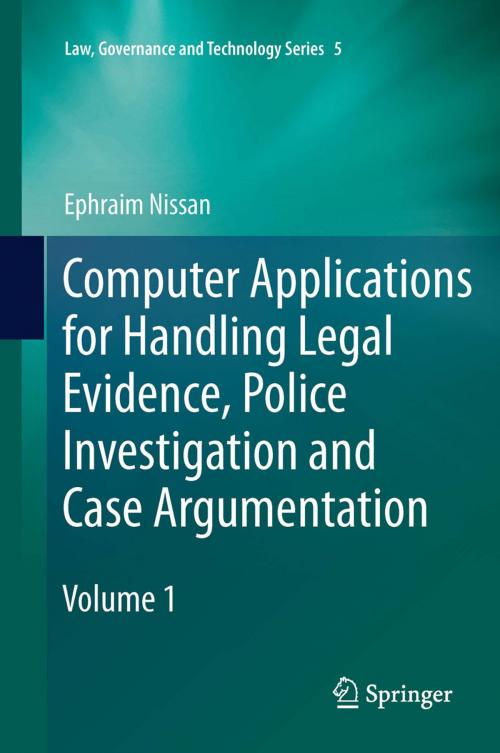Computer Applications for Handling Legal Evidence, Police Investigation and Case Argumentation
Nonfiction, Computers, Database Management, Data Processing, Social & Cultural Studies, Social Science, Crimes & Criminals, Criminology| Author: | Ephraim Nissan | ISBN: | 9789048189908 |
| Publisher: | Springer Netherlands | Publication: | June 15, 2012 |
| Imprint: | Springer | Language: | English |
| Author: | Ephraim Nissan |
| ISBN: | 9789048189908 |
| Publisher: | Springer Netherlands |
| Publication: | June 15, 2012 |
| Imprint: | Springer |
| Language: | English |
This book provides an overview of computer techniques and tools — especially from artificial intelligence (AI) — for handling legal evidence, police intelligence, crime analysis or detection, and forensic testing, with a sustained discussion of methods for the modelling of reasoning and forming an opinion about the evidence, methods for the modelling of argumentation, and computational approaches to dealing with legal, or any, narratives. By the 2000s, the modelling of reasoning on legal evidence has emerged as a significant area within the well-established field of AI & Law. An overview such as this one has never been attempted before. It offers a panoramic view of topics, techniques and tools. It is more than a survey, as topic after topic, the reader can get a closer view of approaches and techniques.
One aim is to introduce practitioners of AI to the modelling legal evidence. Another aim is to introduce legal professionals, as well as the more technically oriented among law enforcement professionals, or researchers in police science, to information technology resources from which their own respective field stands to benefit. Computer scientists must not blunder into design choices resulting in tools objectionable for legal professionals, so it is important to be aware of ongoing controversies. A survey is provided of argumentation tools or methods for reasoning about the evidence. Another class of tools considered here is intended to assist in organisational aspects of managing of the evidence.
Moreover, tools appropriate for crime detection, intelligence, and investigation include tools based on link analysis and data mining. Concepts and techniques are introduced, along with case studies. So are areas in the forensic sciences. Special chapters are devoted to VIRTOPSY (a procedure for legal medicine) and FLINTS (a tool for the police). This is both an introductory book (possibly a textbook), and a reference for specialists from various quarters.
This book provides an overview of computer techniques and tools — especially from artificial intelligence (AI) — for handling legal evidence, police intelligence, crime analysis or detection, and forensic testing, with a sustained discussion of methods for the modelling of reasoning and forming an opinion about the evidence, methods for the modelling of argumentation, and computational approaches to dealing with legal, or any, narratives. By the 2000s, the modelling of reasoning on legal evidence has emerged as a significant area within the well-established field of AI & Law. An overview such as this one has never been attempted before. It offers a panoramic view of topics, techniques and tools. It is more than a survey, as topic after topic, the reader can get a closer view of approaches and techniques.
One aim is to introduce practitioners of AI to the modelling legal evidence. Another aim is to introduce legal professionals, as well as the more technically oriented among law enforcement professionals, or researchers in police science, to information technology resources from which their own respective field stands to benefit. Computer scientists must not blunder into design choices resulting in tools objectionable for legal professionals, so it is important to be aware of ongoing controversies. A survey is provided of argumentation tools or methods for reasoning about the evidence. Another class of tools considered here is intended to assist in organisational aspects of managing of the evidence.
Moreover, tools appropriate for crime detection, intelligence, and investigation include tools based on link analysis and data mining. Concepts and techniques are introduced, along with case studies. So are areas in the forensic sciences. Special chapters are devoted to VIRTOPSY (a procedure for legal medicine) and FLINTS (a tool for the police). This is both an introductory book (possibly a textbook), and a reference for specialists from various quarters.















